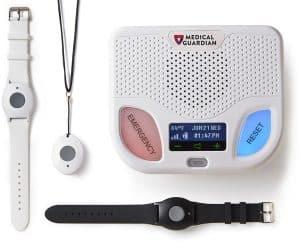
Image credit: Medical Guardian
Are you curious if a medical alert system would be the best solution for yourself or for your senior loved one? Fortunately, medical alert systems with fall detection are an excellent option for many situations, as it provides a resource that supports health and wellness at home and on the go. Older adults can benefit from the peace of mind knowing a friendly and helpful operator is just a button-push away, and their family members can even keep tabs on how their loved one is doing at home by visiting an activity dashboard.
Before you make your decision on which medical alert system could work for you, do your research. Not all systems are created equal, and not every system is the best choice for different needs or preferences. Medical alert system costs can vary widely. You can research Life Alert cost here on our site. Here are just a few things to consider before buying a medical alert system.
Where will the unit be installed?
First things first, you must decide where the base unit of the system will be installed. This will not only help prepare you for the installation process, but it can also make a difference in which device you choose.
If you or your loved one are homebound, which means they stay at home at least 80% of the day and only leave when accompanied to appointments and errands, you might benefit from a medical alert device that has a base system. This home base unit could be installed in the living room or kitchen, as these are typically centrally located in the home, or the bedroom if that’s where your loved one spends most of their time.
In contrast, if you or your loved one are active and on-the-go, you might not need a device that has a base station. Instead, you can use a pendant or watch-style device that runs with GPS and WiFi.
Will your loved one wear a medical alert device?

Medical alert devices aren’t just pendants anymore, making them more appealing to active adults. Image credit: Medical Guardian
In order for a medical alert system to work as effectively as possible, the user must commit to wearing the alert device. While most medical alert companies offer a variety of pendant or watch-style options, there are some users that reject the idea of wearing one altogether. In these situations, it might be best to find a system that uses real-time monitoring throughout the home with sensors on the wall. Cherry Home, for example, maintains privacy while using technology to detect falls or unusual activity.
Typically, seniors who have a history of falling are more likely to be open to wearing a medical alert device. Older adults living with 3 or more chronic conditions are also more likely to wear a device. Active seniors without a history of falling are typically more resistant to wearing a device and often prefer to just use a cell phone in case of emergency. However, this method only works if they have their cell phone on them at all times.
If you are worried that your loved one may reject the idea of a medical alert system, consider reaching out to their physician. Advice from their trusted doctor can lead them to consent to use a medical alert device and can eliminate any confrontation.
Should one use a landline or cellular service?
There are multiple options for medical alert systems, including how they connect with the monitoring center. The most traditional type of medical alert system is connected to the user’s landline. Life Alert Systems is one of the most well known on the medical alert system scene and still offers a base device connected to a landline along with a pendant the user would push when help was needed.
This landline option is still available across a few medical alert system companies. Connecting to the landline means the user has to have a landline in the first place, which can eliminate a large group of seniors who only use a cell phone. However, if your loved one has a landline and is home the majority of the day and night, a traditional system could be your best bet. But please note that the reliability of landline service these days can cause issues in communicating with the monitoring center, so it may be best to ask for a cellular version, if available.
In contrast, a more active senior could benefit from a device that does not have a base station and connects only via cellular service. These systems and devices are designed to provide assistance no matter where the user is, whether it is in the parking lot of the grocery store, outside in the garden, or in their bathroom shower.
If you aren’t sure which could work best for you, consider choosing the cellular option simply because it is more flexible to your current and future needs.
What features should I look for?
Today’s medical alert systems come with a variety of features that can make them more effective or user-friendly. You can choose a company that has pendant or watch-style devices, as well as devices that are waterproof so you can wear them in the shower or swimming pool. Further, you can search for systems that offer GPS or WiFi capabilities to further increase their effectiveness.
We recommend searching for devices and systems that offer 24-hour technical support as well as automatic fall detection. Using multiple sensors, devices that feature fall detection technology can determine what is a normal daily activity and what is a potential fall. When the device detects a potential fall, it alerts the monitoring center for quick follow up. Although fall detection technology is not perfect, it may provide additional peace of mind.
What is the installation and management process like?
Typically, installation is quick for most medical alert devices. Medical Guardian and Philips Lifeline, for example, ship devices the same day they are ordered. Life Alert Systems ships via UPS and arrives in approximately 3 business days. Professionally installed systems, offered by a few companies, are scheduled on a user by user basis.
Once the device arrives, activation is speedy too. Users can begin setting up their devices and preferences on the same day.
How much do medical alert systems cost?
Medical alert systems vary in cost. Typically, systems have an activation fee or equipment fee, as well as an ongoing monthly charge. Users should inquire about waiving activation or equipment fees prior to purchase, as some companies may honor those requests.
It is important to consider if you want to be locked into a long-term contract as well. While most medical alert device companies operate on a month-to-month basis with clients, although Life Alert requires a 3-year contract.
Who gets called when the emergency help button is pushed?
It’s important to understand who is going to answer the call when you push your medical alert device button. You should consider where the call center is located as well as any language preferences you or your loved one have. You should also inquire about the average amount of time it takes for the monitoring center to respond.
We recommend searching for a company that uses a TMA Five Diamond Certified monitoring center. We also recommend looking for a call center that has translation capabilities if you or your loved one communicates in another language.
What happens if one is too far away from the base station and can’t hear the call center?
Once your button is pushed, the monitoring center will know that you are in an emergency situation and will contact EMS and your loved ones in the order you had prescribed, if you are unable to speak. If you are concerned about communicating with the call monitoring center if you fall too far away from your home base device, consider choosing a system that communicates through the pendant itself.
How often should I test the device?
Most reputable medical alert device companies have regularly occurring testing cycles for the communication of your device to the monitoring center, depending on the system. For example, Medical Guardian automatically tests your device with the monitoring center monthly. Philips Lifeline automatically tests its devices weekly. You still need to test your button yourself to be sure it is functioning properly with any system or provider. We suggest weekly or monthly tests but check with your service provider for guidance on your particular system.
What happens if I get the unit and decide I don’t want it?
If you are on a month-to-month service plan with a medical alert system company, you can cancel at any time. For long-term contracts, you will be penalized for leaving your contract early unless there is a major life event like a 24 hour care requirement or death.
Summary
Medical alert systems are an excellent solution for seniors wanting peace of mind and safety while at home or on-the-go. However, not all systems will meet your individualized needs or preferences. Be sure you take the time to research factors like cost, user-friendliness, and safety when making your final determination.
It might take a few extra online searches for reviews as well as a few phone calls to the final companies on your list in order to make your most confident decision. Fortunately, all that research will help you find the best fit for your situation.


